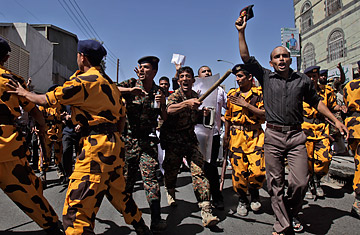
Riot police charge towards anti-government demonstrators during a demonstration demanding the resignation of President Ali Abdullah Saleh in Sanaa, Yemen.
The mood at the makeshift camp is almost festive if it were not for the angle — small tents encircle an obelisk that men climb to scream mantras against President Ali Abdullah Saleh, the military leader who has been in power in Yemen for over three decades. People hand out food, sing and even spend their days dancing in this spot in front of the University of Sana'a in the capital. Numbering around 2,000, they are the true believers of the anti-regime cause, desperately trying to rally in bigger numbers, explaining their relatively small numbers (compared to the massive turn-outs in Egypt) by saying that their fellow citizens are staying away due to a mixture of apathy and fear.
Fear is just up the road, almost out of sight but never out of mind. There, the baltegeya, the thugs, are waiting, armed with guns, rocks, shards of concrete and wooden batons.
Late Tuesday night, just before midnight, pro- and antigovernment protesters started taunting each other in the street, separated by a line of riot police sent in to keep the two sides apart. Though they began by chanting, the protesters soon started lobbing rocks at each other over the human police barrier. Trying to disperse the crowds, the cops started firing in the air. But under the dim amber streetlights, the sound of gunfire only seemed to provoke the baltegeya into action.
Pulling out their AK-47s, they started running forward and firing at their the anti-Saleh crowd, according to eyewitnesses. By the time the ambulances had arrived, the streets were covered in sharp-edged concrete missiles and bullet casings. Two young anti-government protesters were killed and 10 injured.
It's not clear who the baltegeya are. The anti-regime activists say they are a mixture of plain-clothes police and tribesmen that the regime has been paying to bully the demonstrators. The government denies both claims. On Wednesday night, a government source said President Saleh had issued a directive that "instructed all security services to thwart all clashes and prevent direct confrontation between pro and anti government protestors." It asked police "to offer full protection for the demonstrators" but asked protesters "to remain vigilant and take all precautionary steps to prevent the infiltrations of individuals seeking to carryout violent actions."
One activist, who asked to be named Ms. Ahmed, says the government is fostering a culture of fear to keep its opponents off the streets. "It's only safe here in the day, at night the police give no protection for us from the thugs," she told TIME. "The pro-government guys are everywhere," she added. A crowd of male protesters stood around her to listen in, but made sure to keep a couple feet away as is custom in this deeply conservative society.
Ms. Ahmed says people are scared for their lives and for the safety of their families so they do not dare join the anti-government protests. Many Yemenis fear that the ubiquitous secret police will report their political leanings and plans. "The government listens to our phone calls and hires people to look at Facebook," says Ms. Ahmed. "We are trying to coordinate with people around the country, but we are too scared to call them." She then marches away, the surrounding men hastily moving aside to allow her passage.
Protesters accuse the government of playing sly, if morbid, games to demoralise and break them up. The dead, they say, are stripped of ID cards to prevent protesters from identifying them and rallying the deceased's friends and families to the commemorative demonstrations. Meanwhile, the injured are taken straight to prison — sequestered from media and public attention. Anti-government youth have tried to open websites for the cause, only to have them promptly shut down by hackers. Even getting to the demonstrations is risky. Ms Ahmed said she has chosen to walk after hearing stories of people who jump into taxis and ask to be driven to the protests only to find themselves taken straight to the police station. Cabbies are notorious in Sana'a for being informants.
The big players in Yemen who might be able to assemble the larger numbers — the main opposition parties and tribal sheikhs — have spent the past month sitting on the fence, unwilling to commit to either Saleh or his young student opponents. Not one of them wants to be seen as a ringleader of a failed revolution. Meanwhile, the large civil society of Egypt, which came out in droves against Hosni Mubarak, just doesn't exist in Yemen, the poorest country in the Middle East. Whether or not the bloodshed on Tuesday night rouses the rest of the country to join the opposition remains to be seen. But, only a couple blocks from the tent city at the university and the scene of the baltegeya confrontation, there are no signs that the rest of the Sana'a is demanding a revolution.
